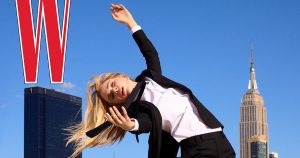‘Beyoncé said: you’re so silly, I love you!’ Tierra Whack, America’s most creative rapper | Rap
There’s a video of Tierra Whack filmed when she was 15, dressed in dull pink knitwear on the corner of a Philadelphia street, surrounded by older guys smoking weed. “Rapping is my destiny / Especially for these hysterectomies who be testing me / You deaf to me / You’re not hearing what I’m sharing like an uncaring parent …” Words pour out of her in an a cappella freestyle to camera, more performance poetry than rap, voice morphing from one persona to another – one of those mic-drop, jaw-drop moments where you see a new star gather light in real time.
Thirteen years later, and the knitwear is bright and expensive, she’s a muse to Beyoncé and has become one of the most singular rappers and singers in America. Her 2018 debut album, Whack World, felt like a piece of performance art with 15 multi-genre tracks each exactly one minute long; her feature film last year, Cypher, flipped the tired fly-on-the-wall music documentary format into a satirical horror movie about conspiracy theories and selling out. While many rappers align themselves with luxury brands, Whack did a campaign with Lego, and her brilliant second album, World Wide Whack, out this week, shows off that whimsy on songs about an imaginary friend, dates at the cinema and singing in the shower. But it is also devastatingly honest about her experience of depression. “I’m 28 now – I was supposed to kill myself when I was 27,” she tells me in the London offices of her record label. “But I decided to keep going.”
Her creative spark dates back to a school where her fashion sense marked her out – she wore different-coloured Converse trainers on each foot. Today, she’s in a deep purple Adidas tracksuit and saucer-sized gold earrings with the word Whack – her real surname – spanning their diameter. And she pours out words in torrents: frequently a new thought will come to her and she’ll excitedly reroute the conversation. “I don’t like public speaking because I don’t l know what I’m going to say,” she admits. “Interviews are weird for me. Most times I go off on a tangent.”
The rush of delivering a poem on stage at school in north Philadelphia sent her towards rap. “When I was first starting to become a poet, an MC, I was like: maybe I should talk about what everyone is talking about,” she says. “I’m listening to Wu-Tang Clan, talking real badass and trying to fit in. But I had to do so much research to find out what these rappers were talking about – OK, what’s an M16?” she laughs. “A lot of OGs and homies was saying: ‘I don’t think you’re living that lifestyle you’re talking about.’ Plus my mom told me this is not going to work – no cursing! I stopped writing: man, forget it, I’m done being a rapper.”
Lauryn Hill’s awe-inspiring blend of rap and song reignited her, alongside “animated, cool people: Busta Rhymes, Missy Elliott, Eminem. I started writing about really weird stuff, like a party full of giraffes.” She began singing and songwriting, too – “listening to Stevie Wonder, the Isley Brothers” – to try to break out of Philly’s insular freestyle rap scene.
“A lot of people from my city were staying at the same level, nobody really went through the ceiling, besides Meek Mill,” she says, and she encountered plenty of people trapped by that lack of ambition. After singing and rapping at a studio session, an engineer told her: “‘You can’t be a jack of all trades and master of none.’ Bro, I’d like to do both – what about Lauryn Hill? ‘Yeah, Lauryn Hill’s different.’ And now I’m good friends with Lauryn Hill. They made it out like I could never.”
Another engineer, her now-manager Kenete Simms, told her: “‘There’s no pattern – but I see beauty.’ One day I’d be doing all rap tracks, the next day I’d be trying to make some country, and he’d be like: ‘This is crazy. I like it!’” These sessions became Whack World, each of its one-minute tracks a polished pop pearl with perfectly rounded melodies and storytelling.
That country song, incidentally, is called Fuck Off, and tells a ratbag lover in a redneck accent: “I hope your ass breaks out in a rash / You remind me of my deadbeat dad.” Whack’s father wasn’t in the picture and she was raised by her mother, whom she speaks about with absolute wonderment. “I’m so obsessed with my mom. My mom never had that motherly love [from her mother], so I want her to feel overwhelmed by mine.”
But Whack has lost plenty of people in her life, one way or another. “I haven’t been in a lot of relationships in my life: maybe two. I just don’t feel like committing – too much responsibility.” Does she feel bruised by love? “Yeah. It’s a childhood love I had and I’m like, damn I miss that. But never going to get it, so.” The man in question went to prison, and the track Meagan Good tells the couple’s story in unflinching detail, from each cheating on the other to Whack upbraiding him for not working on his own rap craft while incarcerated: “We had the same opportunity, I just chose to prevail,” runs one brutal line.
Harder still are the deaths she has had to endure in the past two years – two cousins, who were brothers, each shot and killed in Philadelphia, and her grandmother, the magnificently named Wilma Whack, who died from cirrhosis after years of alcoholism. “I’m straight edge – I don’t do any drugs or alcohol – because I watched my grandma, and that really damaged me. We weren’t on speaking terms when she passed because she had some words for my mom and disrespected her.”
But when Whack went to her grandmother’s house after she died, there were laughs amid the sadness – “her sister cut some of her dreads to keep and she felt my grandma’s body saying: ‘Bitch, don’t touch my hair!’” – and the only picture she had hanging up was of Whack at the Grammys in 2019 when her song Mumbo Jumbo was nominated for best video. “That helps me get up and keep going every day. And I’m thinking of conversations I had with my cousins who wanted to come on tour with me – they’re still with me. I’m not letting these deaths bring me down.”
Whack holds a lot of stock in her own agency to stay amped up. Helped by huge acclaim, she kept herself buoyant in the wake of Whack World, releasing a string of singles and the superb Pop?, Rap? and R&B? EPs, which continued to shrug at genre boxes.
Another fillip was Beyoncé recruiting her for the Afro-house track My Power on her Lion King soundtrack and Black Is King musical film. “It was really good to meet her,” she says. “Everyone on set was like” – she puts on a stern manager-type voice – “‘Call her Miss B.’ And I was like: ‘Hey Beyoncé!’ And she busted out laughing, like, ‘you’re crazy’. Everyone wanted to make sure they were protecting the queen. But I was just myself and she was like: ‘You’re so silly, I love you.’” Beyoncé has been chanting her name every night on the Renaissance tour in a roll-call of Black female excellence during Break My Soul: “Lauryn Hill, Roberta Flack / Toni, Janet, Tierra Whack.” Whack calls the shoutout “unbelievable – and she never misses my name. She’ll be dancing and go ‘Tierra. Whack.’ She always hits it. I’m like: yessss!”
But impostor syndrome crept in and Whack’s mental health deteriorated. “I was so happy at one point – but then it just became too much. Being a public figure, and figuring it out every day, it gets overwhelming. I wanted to disappear. I wanted to be forgotten about.”
She says she couldn’t fully access her emotions and was “afraid of crying” – partly a product of her Philly upbringing, where she was “low-class, living in the projects, so I seen some real shit go down. I thought I was going to be shot just playing in the back yard. I would never show anybody any sign of weakness – you had to be rough and tough.”
She got past her depression, she says, by “literally doing the cliches. Waking up and saying: today I’m going to have a good day. Looking in the mirror and saying: you deserve all of this. I wasn’t doing that before. Stretching, resting, doing things that I want to do in my free time.”
She deals with the darkness through her music; she uses a slumped, slurred vocal tone on the new tracks Numb and Difficult (whose chorus is: “Living is difficult”). But she leavens it with humour. On Two Night, she sings: “I might die tonight / But before I go, want to let you know / I didn’t pay the light bill this month”, and on 27 Club, “Looking for something to commit to: suicide.”
“It’s a sick joke, right?” she laughs. “I’m always trying to remind everyone else: humans, we have multiple emotions. Happy, sad, bitter, angry, sweet.” Her self-guided mental health management won’t work for everyone, but you get the sense that this is a good channel for Whack’s barely containable energy. “I’m working in the right direction. When I was depressed I was so negative, a Debbie Downer, just sulking in it. Now it’s better energy – just being positive. It’s a decision you have to deliberately make.”
So she’s relaxed back into her skin again, like that kid who wore mismatched shoes. “At first when I walked in label offices for meetings …” She mimes being a classy businesswoman. “But now I’m like: y’all gotta accept me for me, every version of me. I was hiding a little bit before, making sure I was suit and tie. But now I’ll show up with my ass out and my feet stink.”
World Wide Whack is released 15 March on Interscope





